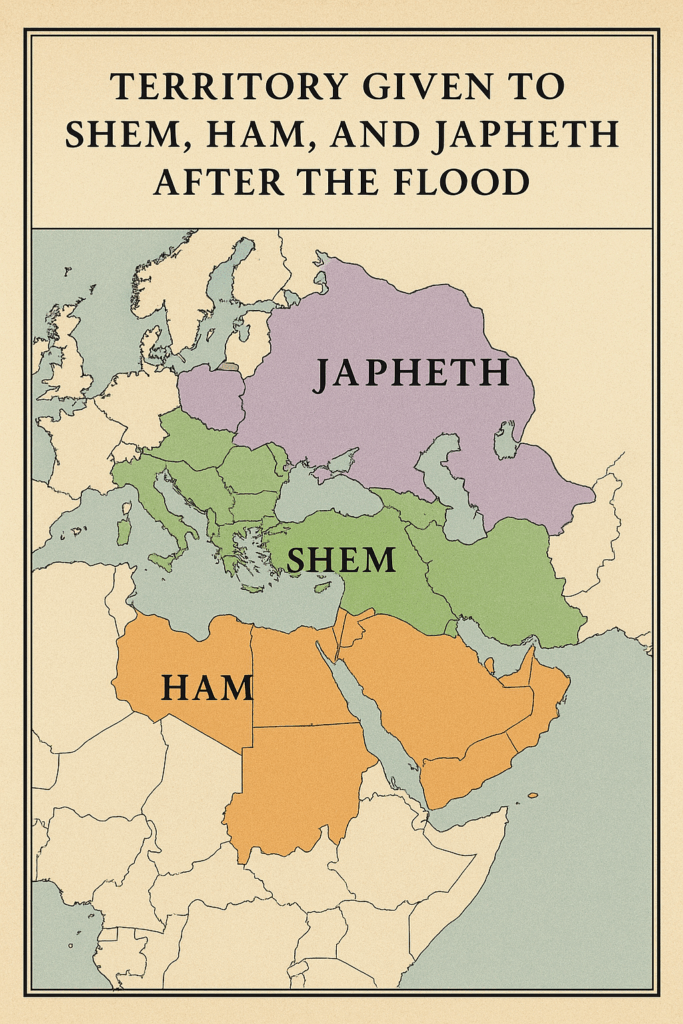Once the covenant child was born, issues arose between him, Isaac, and Abraham’s firstborn son, Ishmual. This devotional reading looks at how Abraham sent Ishmael away, a common practice for the time.
Nuggets
- The weaning of a child was a time for celebration.
- Ishmael and his mother Hagar made fun of Isaac.
- It was Sarah’s idea that Ishmael be born in the first place, but now she just wanted him to go away.
- It was Jehovah’s direct command to Abraham that got Hagar and Ishmael cast out.

Sarah got impatient for Jehovah’s promise of a son to be fulfilled. She was probably feeling inadequate and despondent because of her barrenness. To help the promise along, she offered her slave-girl Hagar to her husband to have a child through her.
While that was perfectly legal in Abraham’s culture, that wasn’t what Jehovah had intended. He planned a true son and heir be born to Abraham and Sarah.
But the relationship between Ishmael, Hagar’s son, and Isaac, Sarah’s son, was not the best. Let’s take a look.
Let's Put It into Context
To read devotions in the Creating Everything theme, click the button below.
Devotions in the Abraham the Patriarch series
About to be Weaned
“When Isaac grew up and was about to be weaned, Abraham prepared a huge feast to celebrate the occasion” (Gen. 21: 8 NLT)
The weaning of a child was a time for celebration.
We have to look at Abraham’s culture to see what their practice was in weaning a child. It is totally different from today.
Early childhood was not without its peril. It was a vulnerable stage with a high infant mortality rate.
According to Got Questions, we do have some idea about weaning practices. They wrote, “According to Jewish rabbinical traditions, weaning could take place anywhere between 18 months and 5 years of age.” Bible Hub thought Isaac would have likely been a two- or three-years-old child.
Resources
Because the child survived this vulnerable stage, a celebration — a mishteh gadol — was thrown. It was to thank Jehovah for His provision and protection.
The term mishteh means feast, banquet, or drinking party. It was the type of feasts given in the book of Esther.
The term gadol is attributed to spiritual greatness. It encompasses both of the greatest commandments: love of Jehovah and love of others.
Abraham would have had another reason for celebration. Isaac was the sign of the covenant between Jehovah and Abraham.
Frand talked about the importance of a toddler’s development. The time of weaning would be around the time when a toddler becomes aware of other people in the world.
Resource
I see that. Paul wrote that we want to be weaned off milk and stop being milk babies. We are to grow to be steak adults.
“You have been believers so long now that you ought to be teaching others. Instead, you need someone to teach you again the basic things about God’s word. You are like babies who need milk and cannot eat solid food. For someone who lives on milk is still an infant and doesn’t know how to do what is right. Solid food is for those who are mature, who through training have the skill to recognize the difference between right and wrong” (Heb. 5: 12-14 NLT).
Trouble in the Household
“But Sarah saw Ishmael — the son of Abraham and her Egyptian servant Hagar — making fun of her son, Isaac. So she turned to Abraham and demanded, ‘Get rid of that slave woman and her son. He is not going to share the inheritance with my son, Isaac. I won’t have it!’” (Gen. 21: 9-10 NLT)
Hagar and Ishmael Making Fun of Isaac
Ishmael and his mother Hagar made fun of Isaac.
Let’s look at this from Ishmael’s perspective. To do that, we need to look at the timeline.
1874 BC — Ishmael born (Gen. 16: 15)
1861 BC — God reestablished His covenant with Abram; and Abraham, Ishmael, and males are circumcised (Gen. 17)
1860 BC — Isaac born (Gen. 21: 2)
c. 1858 BC — Isaac weaned (Gen. 21: 8)
Resource
If Ismael was 14 when Isaac was born, this would put him at around 16 when Isaac was weaned. For 16 years — even if he knew about the covenant — he probably thought there was a chance that he would be Abraham’s heir.
Yes, if Isaac hadn’t been born, Ishmael would have qualified as Abraham’s heir. But look what Bradford said. He taught, “Abraham would have a son……not a kind-of-son…..not a good-enough heir….but a true son and a true heir regardless of what the earthly human circumstances might seem to dictate.”
Resource
We know Ishmael was much loved by Abraham. We’ll find that out in the next couple of verses.
But come on. “And Sarah saw the ben of Hagar the Egyptian, which she had borne unto Avraham, metzachek (mocking, scoffing)” (Gen. 2: 9 OJB).
A 16-year-old was mocking and scoffing a 2- or 3-year-old? Bradford said he was probably constantly taunting him.
But think about it. Worldview is always going to hate spiritual. They will never really be able to live together.
Sarah Demanded
It was Sarah’s idea that Ishmael be born in the first place, but now she just wanted him to go away.
We get the idea that things didn’t go as Sarah planned. We know Hagar held Sarah in contempt after she became pregnant. Well, Sarah and Abraham — and even Jehovah — still considered Hagar a shifchah, a female slave of the lowest rank.
Plus, after the covenant son was born, any standing Hagar gained in that plan would have gone down. A good-enough heir was no longer needed.
That attitude impacted how Ishmael saw Isaac.
Both Hagar and Ishmael have been disrespectful to Sarah and Isaac. They have been impolite at best, rude at worst.
Don’t forget this fact. Hagar was Sarah’s slave, not Abraham’s. “But Avram said unto Sarai, Hinei, thy shifchah [female slave of the lowest rank] is in thy hand; do to her as it pleaseth thee…” (Gen. 16: 6 OJB).
Sarah was operating legally with regard to Hagar. But Abraham, as Ishmael’s father, had the final determination whether he would be allowed to go with Hagar.
In other words, Abraham could have kept Ishmael and sent Hagar away.
When Abraham agreed to send Ishmael away, his inheritance flew out the door.
God Told Abraham
“This upset Abraham very much because Ishmael was his son. But God told Abraham, ‘Do not be upset over the boy and your servant. Do whatever Sarah tells you, for Isaac is the son through whom your descendants will be counted. But I will also make a nation of the descendants of Hagar’s son because he is your son, too’” (Gen. 21: 11-13 NLT)
It was Jehovah’s direct command to Abraham that got Hagar and Ishmael cast out.
In the end, Sarah was following God’s plan to banish Ishmael and Hagar from the clam because Jehovah told him to do it.
Jehovah does want us in the world, but there are times He wants us separated. When Jesus was born, all the babies under two were killed so that only the Messiah lived. Jehovah didn’t want another boy child from Bethlehem born during that time to claim to be the Messiah.
Here, Jehovah did not want any confusion about who the covenant child was. This is especially true since, for 13 years, Ishmael would have been considered the firstborn.
Isaac was a Hebrew. Ishmael wasn’t.
It wasn’t about ancestry. Jacob was a Hebrew. Esau wasn’t.
Bottom line, Isaac was the covenant son. Ishmael wasn’t. Jehovah’s choice had nothing to do with birth order and everything to do with the heart.

Still, Jehovah told Abraham that He would take care of Ishmael. Did Jehovah do this to calm Abraham’s spirit regarding the decision? Maybe.
Look at why Bradford said why God would take care of Ishmael. He taught,
“… there was very good reason that God promised Abraham that Ishmael would be divinely blessed, and divinely prospered. Law codes of this era and this area have been discovered; and the exact case we have here is discussed. Known as the law of Lipit-Ishtar, here’s how it works: Abraham had the right to accept or deny Ishmael as an heir to his estate, BECAUSE Ishmael was born to a slave woman. It is obvious by all accounts that Ishmael had been accepted by Abraham as the heir-apparent of the clan. Therefore, Ishmael was to have been given the firstborn’s share of Abraham’s very substantial wealth; and by this, Hagar, Ishmael’s mother, would also have benefited.”
Resource
Yes, Abraham knew Ishmael wasn’t the covenant son. Jehovah made that clear. But He also made it clear that He would bless Ishmael.
“So Abraham said to God, ‘May Ishmael live under your special blessing!’ But God replied, ‘No — Sarah, your wife, will give birth to a son for you. You will name him Isaac, and I will confirm my covenant with him and his descendants as an everlasting covenant. As for Ishmael, I will bless him also, just as you have asked …” (Gen. 17: 16-18 NLT).
Dykes made an interesting comment. Wasn’t it in Ishmael’s best interest to be removed from under Abraham’s care at that age? If he had stayed, wouldn’t he have dreamt of inheriting Abraham’s wealth and prestige? Wouldn’t have Ishmael become even more envious?
Resource
As Isaac grew up, how would he have responded to Ishmael? Would he have stood up to him, or would he have caved? We’ll find out that about Isaac’s introspective nature — so you draw your own conclusion.
For all parties involved, it was better to cut Ishmael’s dream of an inheritance off right then.
In fact, Candlish noted this separation of heir from siblings was common in that culture. It was done to safeguard the main inheritance and prevent sibling rivalry. This was seen as a way to manage the inheritance.
Resource
In a way, it sounds like the father was trying to designate a single heir. Yes, this heir would get the bulk of the wealth.
But this son would also become the head of the family at the father’s death.
We will see how Abraham dealt with this at the time of his death.
- “Abraham gave everything he owned to his son Isaac. But before he died, he gave gifts to the sons of his concubines and sent them off to a land in the east, away from Isaac” (Gen. 25: 5-6 NLT).
- “His sons Isaac and Ishmael buried him in the cave of Machpelah, near Mamre, in the field of Ephron son of Zohar the Hittite” (Gen. 25: 9 NLT).
If Ishmael was there for the burial, he would have gotten his share of gifts.
Making the Connections #1
Candlish had an interesting thought. He wrote, “Now, it is not necessary to acquit Sarah of all personal vindictiveness, or to consider her as acting from the best and [highest] motives, merely because God commanded Abraham to hearken unto her voice.”
Using Paul’s words — the way I read it — Candlish was saying that Sarah had legitimate reasons for her actions. “And you, dear brothers and sisters, are children of the promise, just like Isaac. But you are now being persecuted by those who want you to keep the law, just as Ishmael, the child born by human effort, persecuted Isaac, the child born by the power of the Spirit” (Gal. 4: 28-29 NLT).
Sarah may have believed she was defending — either herself or her son. She may have been, as Candlish thought, grasping at the chance to secure Isaac’s position as the covenant child.
But let’s think about it. What good would have come if Ishmael had stayed? Would Abraham have started compromising, allowing Ishmael to become more covenant-sonish?
Candlish noted Abraham did what others in his culture did. Other siblings were separated from the heir. In a way, that is what happened when Seth, Ham, and Japheth were separated.

The difference from Noah’s children — when their mission was to repopulate the earth — to Abraham’s day was that the siblings were not sent far away. Candlish said that Ishmael would have been sent to the borders of where Abraham made his home. That would have set the boarder place to be the wilderness of Beer-sheba — not far away at all.
The interesting part was Hagar and Ishmael would have waited in the wilderness of Beer-sheba for directions from Abraham as to their next move.
If that was what was supposed to have happened, we aren’t told why it didn’t.
Making the Connections #2
“So she turned to Abraham and demanded, ‘Get rid of that slave woman and her son. He is not going to share the inheritance with my son, Isaac. I won’t have it!’” (Gen. 21: 9-10 NLT)
Ooo, baby. What must Abraham have thought.
Sarah had once tried to put Abraham between her and Hagar. “Then Sarai said to Abram, ‘This is all your fault! I put my servant into your arms, but now that she’s pregnant she treats me with contempt. The Lord will show who’s wrong — you or me!’” (Gen. 16: 5 NLT).
But this was his first-born.
Robinson gave another reason why it would have been important to separate Ishmael from the covenant son. He wrote,
“The hot blood of the Egyptian mother which coursed through his veins could not have been kept in check in the domestic circle among vassals and [dependents]; he was sent to measure himself with men, to cat out his own way in the world, to learn independence, resolution, energy; and it is for this reason that to this very day his [dependents] are so sharply stamped with all the individuality of their founder. In them are exhibited the characteristics of Abraham and Hagar, the [marvelous] devoutness of the one with the fierce passions of the other, and together with these the iron will, the dignified calmness of self dependence wrought out by circumstances in the character of Ishmael.”
Resource
I keep thinking about the different personalities of the boys.
- This son [Ishmael] of yours will be a wild man, as untamed as a wild donkey! He will raise his fist against everyone, and everyone will be against him. Yes, he will live in open hostility against all his relatives” (Gen. 16: 12 NLT).
- “One evening as he [Isaac] was walking and meditating in the fields, he looked up and saw the camels coming” (Gen. 24: 63 NLT).
I would say that Isaac was more like Abraham. Jehovah would choose the son with the similar disposition.
How Do We Apply This?
- Make sure your heart is right with God.
- Don’t put family above God.
Father God. Family conflicts – especially sibling rivalry – are difficult to handle. We know that we must put You before them. Amen.
If you don’t understand something and would like further clarification, please contact me.
If you have not signed up for the email providing the link to the devotions and the newsletter, do so below.
If God has used this devotion to speak with you, consider sharing it on social media.